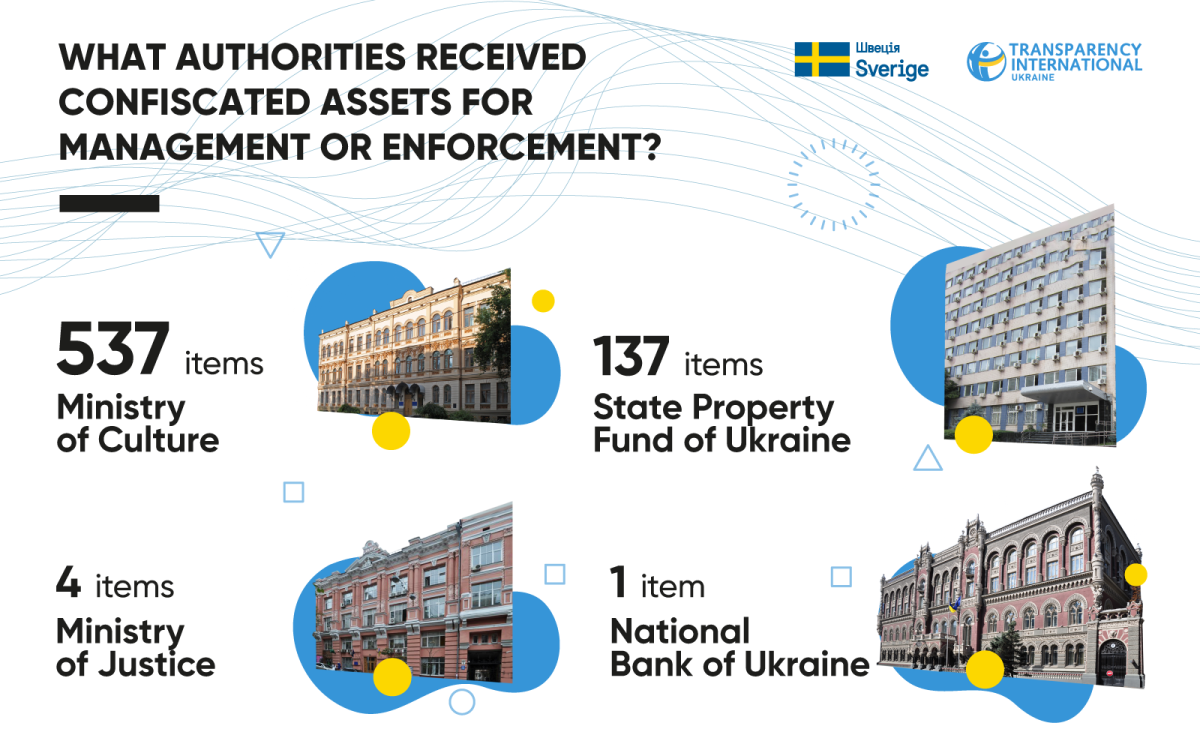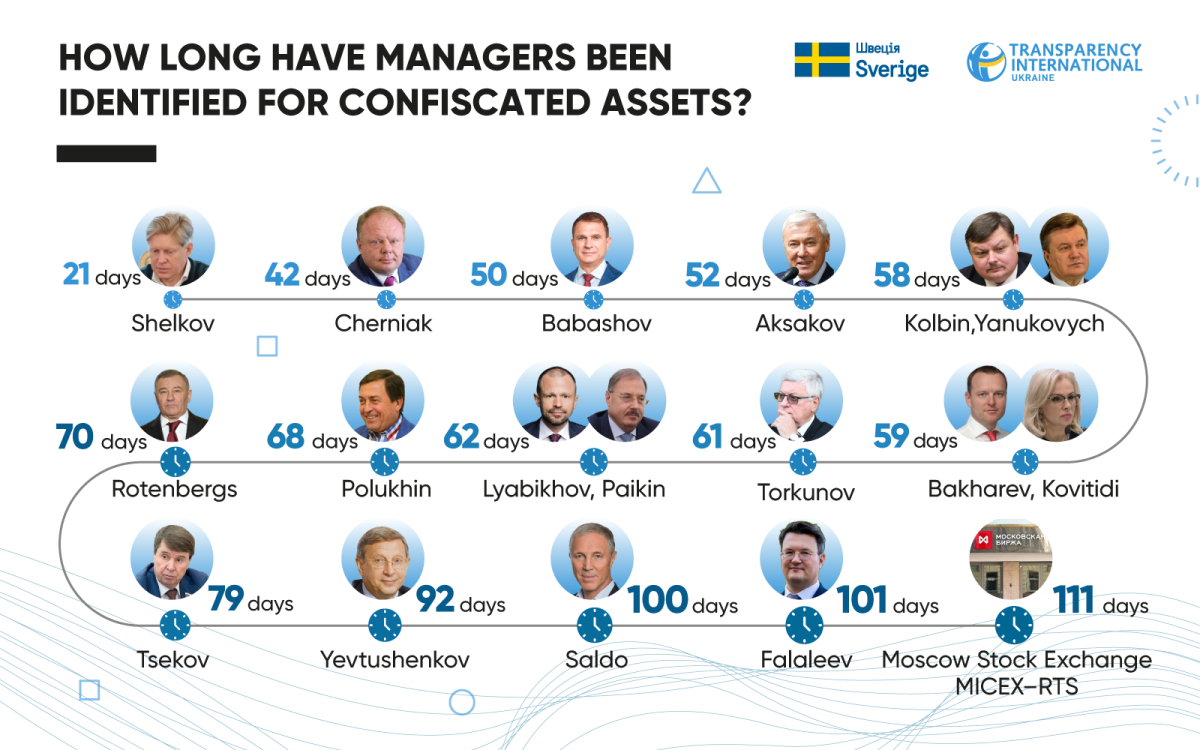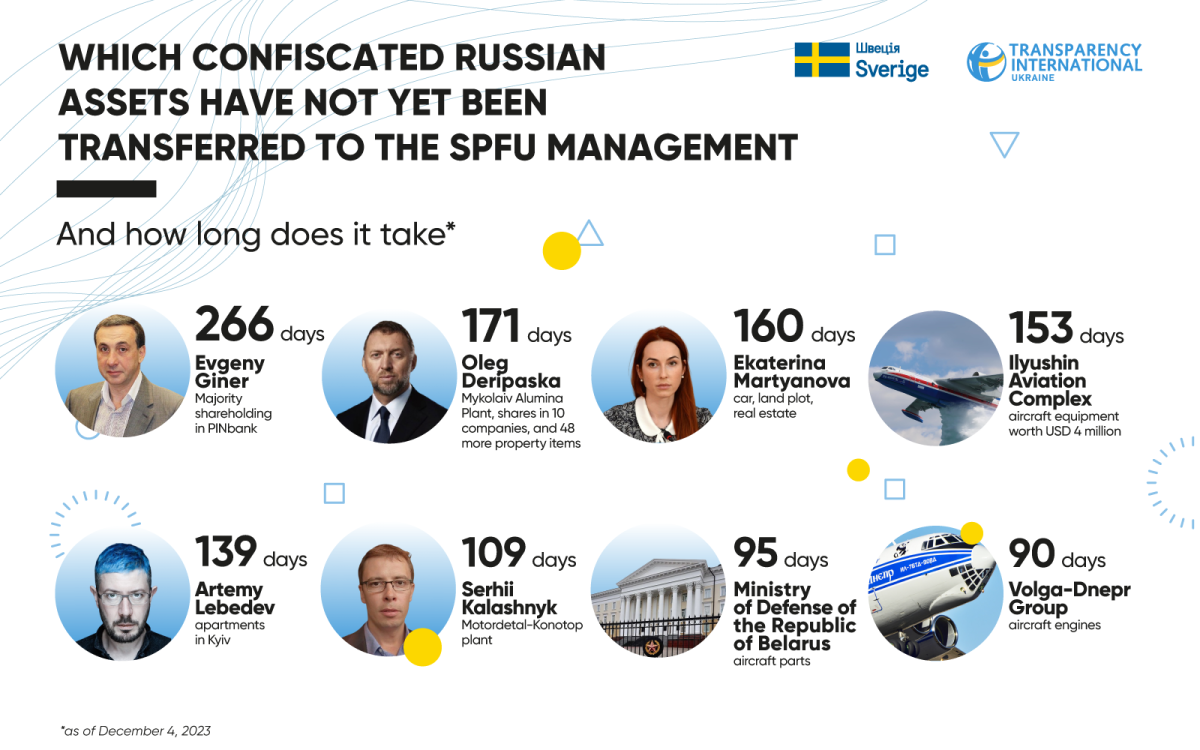

In September 2023, the State Property Fund launched a register of sanctioned assets, providing information on corporate rights, real estate, vehicles, land plots, and other objects confiscated from Russians or their accomplices, which the government transferred to the Fund for management. The register also demonstrates at what stage of preparation for sale a certain asset is.
Information from the register, together with court decisions and government orders, shed light on the processes of transfer and management of sanctioned assets and made it possible to analyze how they take place, whether they are effective, and what problems they cause.
Entities entrusted asset management
Since last December, the government has identified managers for 679 confiscated objects previously owned by 18 sanctioned individuals.
In 13 cases, the State Property Fund became the sole management body. The government also determined the way to enforce court decisions on confiscation: for the most part, their subsequent privatization or lease. Thus, the authority to finally decide the fate of these assets was left with the SPFU.
The Cabinet of Ministers obliged the SPFU to sell certain assets without any alternative.
For example, the share of the Ocean Plaza shopping mall in Kyiv, which belonged to the Russian oligarch Arkady Rotenberg. In early October, the SPFU initiated the sale of 66.65% of the authorized capital of the company owned by the mall before the government through large-scale privatization with a starting price of UAH 1.32 bln. But the decision to privatize the asset has not yet been adopted.
The situation with the former assets of Viktor Yanukovych is also interesting. They were “divided” between three bodies: the SPFU, the Ministry of Culture and Information Policy of Ukraine, and the Ministry of Justice.
20 real estate objects and vehicles were transferred to the Fund for privatization, lease, or to meet the needs of the state. The shortcoming of this decision is the absence of criteria for such a distribution or a certain list of objects that the agency must sell or retain. Therefore, there is a potential risk that part of the liquid assets may remain in the ownership of the state and not be sold.
The State Property Fund became the manager of two well-known residences of the ex-president, Mezhyhirya and Sukholuchchia. But this is only temporary until they are granted the status of a park as a monument of landscape art of national importance. With regard to Mezhyhirya, the parliament even adopted a relevant law: the monument should fall under the control of the Ministry of Environmental Protection and Natural Resources of Ukraine.
The Ministry of Culture, in turn, received as many as 537 historical, cultural, and material values from the collection of Yanukovych for further sale, use, or preservation in state ownership. The total value of these assets is estimated at EUR 18.7 mln, but according to the legislation, cultural and art objects are not subject to privatization or lease. Moreover, these assets continue to be seized in criminal proceedings, and the agency has not taken any action since April 2023 to actually obtain them for management.
The government instructed the Ministry of Justice to collect more than UAH 34 mln from the fugitive president. According to the State Treasury Service of Ukraine, these funds were credited to the national budget and channeled to liquidate the consequences of the armed aggression.
In addition, measures for the recovery of property into the state’s income were entrusted to the Ministry of Justice together with the SPFU in three more cases.
In only one case, the management of confiscated assets was not even partially entrusted to the State Property Fund. The share (1.44%) of PJSC Settlement Center for Servicing Contracts on Financial Markets as a participant in the capital market was transferred to the National Bank of Ukraine for the implementation of “best practices of corporate governance.”
In 13 cases, the State Property Fund became the sole management body. The government also determined the way to enforce court decisions on confiscation: for the most part, their subsequent privatization or lease. Thus, the authority to finally decide the fate of these assets was left with the SPFU.
(Non-)transfer of assets for management
Until September 22, 2023, the manager of sanctioned assets was determined by the Cabinet of Ministers.
However, the law did not clearly define the period during which this was to take place. As a result, one of the negative trends in the asset transfer procedure was the delay by the government in adopting appropriate decisions.
The first cases of the transfer of confiscated assets took three months, which could be interpreted as a lack of precedent in this practice. But in the future, regular delays in adopting appropriate decisions continued, despite the fact that the State Property Fund was determined to be the asset manager for the most part.
On average, the procedure for determining the authorized body for managing assets collected into the state income took a little more than two months. Only in one case did the assets manage to be transferred “promptly”: the manager for property and corporate rights which had belonged to the Russian oligarch Mikhail Shelkov was determined three weeks after the court decision entered into force.
Since September 22, 2023, the functions of managing confiscated assets have been entrusted to the SPFU, removing the “intermediary” represented by the government from the procedure for their transfer. Despite this, some Russian assets are still “lingering.”
If no body can effectively manage the property of collaborator Martyanova, which is located in the temporarily occupied territory, until the restoration of constitutional order, then Deripaska’s former assets in the controlled territory have not been transferred to the SPFU in more than five months. Although, according to Oleksandr Fedoryshyn, the former acting head of the SPFU, the institution expressed its readiness to take Deripaska’s assets into management. As far as shares in the First Investment Bank of the Russian oligarch Giner are concerned, the process of finding a manager has lasted for more than nine months.
In total, more than 200 confiscated real estate objects, vehicles, and corporate rights of companies belonging to eight sanctioned persons and companies have not been transferred to the State Property Fund.
The probable reason is that some of these objects are already managed by the ARMA since law enforcement officers seized them within the framework of criminal cases even before the confiscation. In particular, this is what happened to the assets of the sanctioned Oleg Deripaska (Mykolaiv Alumina Refinery LLC), Evgeny Giner (shares in First Investment Bank LLC), and Artemy Lebedev (apartments in the center of Kyiv).
Despite this, the law clearly provided for the obligation of the Cabinet of Ministers to determine the entity as well as the procedure and method of enforcement of each court decision on confiscation. Therefore, if the government plans to continue keeping these assets under the management of the ARMA, it is necessary to amend the law accordingly.
In total, more than 200 confiscated real estate objects, vehicles, and corporate rights of companies belonging to eight sanctioned persons and companies have not been transferred to the State Property Fund.
Procedural obstacles and further delays
Another factor that affected the efficient management of confiscated assets were measures to secure confiscation claims and attempts to cancel them.
Such measures are taken to prevent the potential alienation of property by the defendant during the consideration of the case in court.
But problems began to arise after the confiscation and transfer of the first assets to the management of the State Property Fund. The agency faced the fact that these measures continued to operate, which made it impossible to re-register these assets to their manager.
In the case of Yevtushenkov’s former assets, the SPFU tried to cancel the measures to secure the claim on its own but was refused because it was not a party to the case. Subsequently, the High Anti-Corruption Court did lift the ban on registration actions, but on its own initiative.
As a result, the process of obtaining the oligarch’s assets into the management of the Fund was delayed for almost nine months; the agency simply could not re-register the assets and prepare them for sale for six months.
Despite the bans in force, the State Property Fund, instead of promptly initiating the cancellation of measures to secure the claim before the Ministry of Justice, continued to issue instructions to its regional offices to re-register assets. And only after the refusal or suspension of registration actions did the Fund appeal to the Ministry of Justice with a letter regarding the lifting of the ban.
For example, as for the former assets of State Duma member Boris Paikin, which were transferred to the SPFU in March 2023, the Fund instructed its regional office to take measures to register ownership only on June 16.
This and other cases also indicate a delay in resolving the issue of the cancellation of measures to secure claims, both on the part of the State Property Fund and the Ministry of Justice. As for the assets of Anatoly Torkunov, the rector of the Moscow State Institute of International Relations and Putin’s proxy in elections, transferred by the government in February 2023, the SPFU, after an unsuccessful attempt to re-register them in March, only appealed to the Ministry of Justice on May 8 to initiate the abolition of security measures. It, in turn, filed a motion to the court only three weeks later.
The High Anti-Corruption Court put an end to this issue, changing its practice on securing claims for confiscation of sanctioned assets. At first, the HACC began to refuse to secure such claims, given that the confiscation of assets is preceded by their mandatory blocking, which itself provides for the prohibition of disposal and alienation. Subsequently, this position was supported by the Appeals Chamber.
However, the analysis of court decisions indicates that the ban on registration actions has not yet been lifted with respect to some confiscated assets. We are talking about assets that belonged to members of the State Duma of the Russian Federation: Roman Liabikhov, Konstantin Bakharev, Alexei Cherniak, and the already mentioned Anatoly Torkunov (not all measures to secure the claim were lifted for his property).
Another factor that affected the efficient management of confiscated assets were measures to secure confiscation claims and attempts to cancel them. But problems began to arise after the confiscation and transfer of the first assets to the management of the State Property Fund.
Results and prospects
An assessment of the practice of transferring confiscated sanctioned assets and their subsequent management shows that this process has not been effective.
In addition to objective obstacles, there are other significant abuses. In particular, they concern the delay or adoption of unreasonable managerial and procedural decisions by key actors involved in the process of recovering sanctioned assets and the enforcement of relevant decisions.
As a result, more than a year after the adoption of the first decision on the recovery of assets into the state income, in addition to the confiscated funds, only one object is at the stage of sale (which ended unsuccessfully). Some of these objects are still at the stage of re-registration, and for others, in violation of the requirements of the law, a manager has not been determined.
The Parliament tried to remedy the situation when it limited the powers of the Cabinet of Ministers to determine the manager for confiscated assets since September 22, instead fully assigning these functions to the State Property Fund.
But at the same time, the legislator created a number of new problems related, in particular, to the transfer and assignment to the State Property Fund of functions for the management of alien assets. Therefore, without further improvement of the legislative regulation, the management of sanctioned assets is unlikely to become more effective in the future.
This publication was prepared by Transparency International Ukraine with the financial support of Sweden.
As a result, more than a year after the adoption of the first decision on the recovery of assets into the state income, in addition to the confiscated funds, only one object is at the stage of sale (which ended unsuccessfully).









